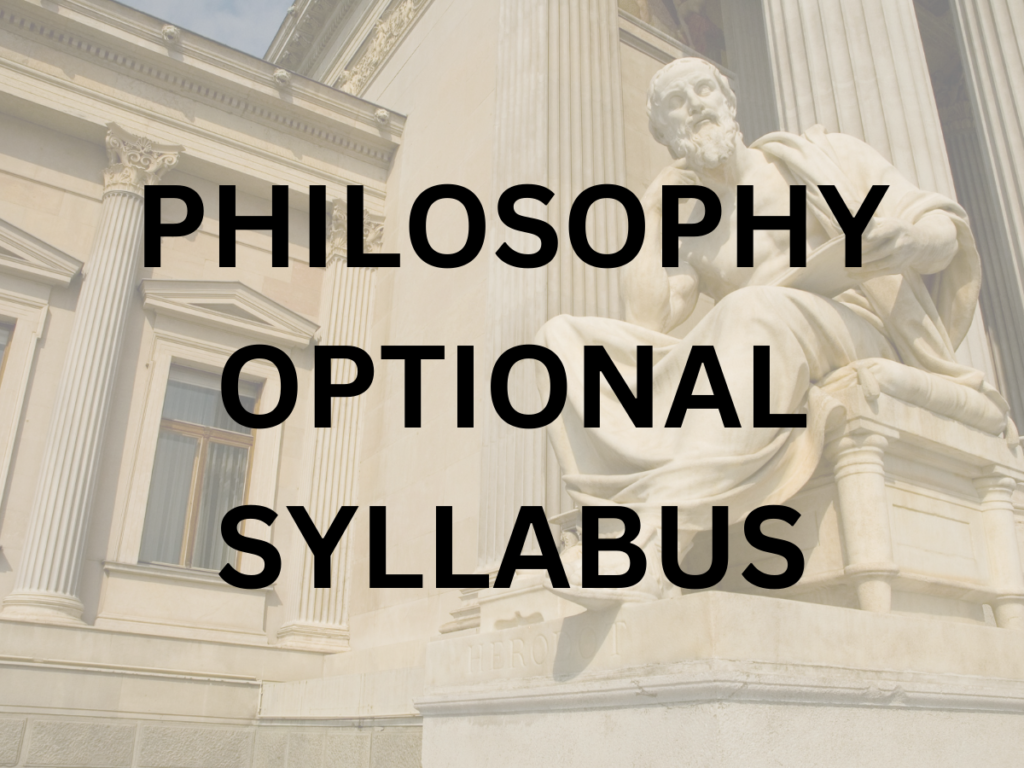Philosophy Optional Syllabus
The Philosophy Optional for the UPSC Civil Services Exam is an intriguing choice for candidates interested in exploring fundamental questions about existence, knowledge, and ethics. The syllabus encompasses key areas such as Indian philosophy, Western philosophy, and logic, providing a rich intellectual framework for understanding various philosophical traditions. Its analytical approach encourages critical thinking and enhances the aspirant’s ability to articulate complex ideas clearly. This post outlines the detailed syllabus for the optional subject of philosophy.
Paper I: Philosophy Optional Syllabus
-
History and Problems of Philosophy:
- Plato and Aristotle : Ideas; Substance; Form and Matter; Causation; Actuality and Potentiality.
- Rationalism (Descartes, Spinoza, Leibniz); Cartesian Method and Certain Knowledge; Substance; God; Mind-Body Dualism; Determinism and Freedom.
- Empiricism (Locke, Berkeley, Hume) : Theory of Knowledge; Substance and Qualities; Self and God; Scepticism.
- Kant: Possibility of Synthetic a priori Judgments; Space and Time; Categories; Ideas of Reason; Antinomies; Critique of Proofs for the Existence of God.
- Hegel : Dialectical Method; Absolute Idealism.
- Moore, Russell and Early Wittgenstein : Defence of Commonsense; Refutation of Idealism; Logical Atomism; Logical Constructions; Incomplete Symbols; Picture Theory of Meaning; Sying and Showing.
- Logical Positivism : Verification Theory of Meaning; Rejection of Metaphysics; Linguistic Theory of Necessary Propositions.
- Later Wittgenstein : Meaning and Use; Language-games; Critique of Private Language.
- Phenomenology (Husserl): Method; Theory of Essences; Avoidance of Psychologism.
- Existentialism (Kierkegaard, Sarte, Heidegger): Existence and Essence; Choice, Responsibility and Authentic Existence; Being-in-the-world and Temporality.
- Quine and Strawson : Critique of Empiricism; Theory of Basic Particulars and Persons.
- Carvaka : Theory of Knowlegde; Rejection of Transcendent Entities.
- Jainism : Theory of Reality; Saptabhanginaya; Bondage and Liberation.
- Schools of Buddhism : Prat Ityasamutpada; Ksanikavada, Nairatmyavada.
- Nyaya—Vaiesesika : Theory of Categories; Theory of Appearance; Theory of Pramana; Self, Liberation; God; Proofs for the Existence of God; Theory of Causation; Atomistic Theory of Creation.
- Samkhya; Prakrit; Purusa; Causation; Liberation.
- Yoga; Citta; Cittavrtti; Klesas; Samadhi; Kaivalya.
- Mimamsa: Theory of Knowlegde.
- Schools of Vedanta : Brahman; Isvara; Atman; Jiva; Jagat; Maya; Avida; Adhyasa; Moksa; Aprthaksiddhi; Pancavidhabheda.
- Aurobindo: Evolution, Involution; Integral Yoga.
Paper II: Philosophy Optional Syllabus
-
Socio-Political Philosophy:
- Social and Political ldeals : Equality, Justice, Liberty.
- Sovereignty : Austin, Bodin, Laski, Kautilya.
- Individual and State : Rights; Duties and Accountability.
- Forms of Government : Monarchy; Theocracy and Democracy.
- Political Ideologies: Anarchism; Marxism and Socialism.
- Humanism; Secularism; Multi-culturalism.
- Crime and Punishment : Corruption, Mass Violence, Genocide, Capital Punishment.
- Development and Social Progress.
- Gender Discrimination : Female Foeticide, Land and Property Rights; Empowerment.
- Caste Discrimination : Gandhi and Ambedkar.
-
Philosophy of Religion:
- Notions of God : Attributes; Relation to Man and the World. (Indian and Western).
- Proofs for the Existence of God and their Critique (Indian and Western).
- Problem of Evil.
- Soul : Immortality; Rebirth and Liberation.
- Reason, Revelation and Faith.
- Religious Experience : Nature and Object (Indian and Western).
- Religion without God.
- Religion and Morality.
- Religious Pluralism and the Problem of Absolute Truth.
- Nature of Religious Language : Analogical and Symbolic; Cognitivist and Non-cognitive.
